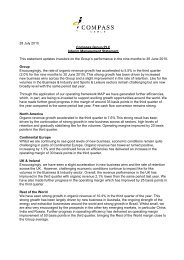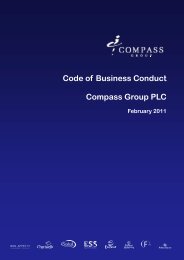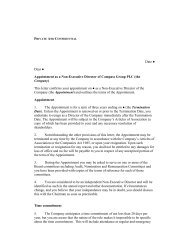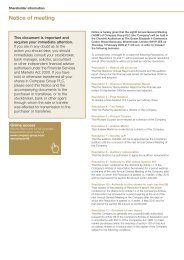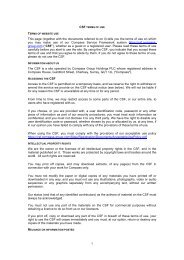2568.11 kb - Compass Group
2568.11 kb - Compass Group
2568.11 kb - Compass Group
Create successful ePaper yourself
Turn your PDF publications into a flip-book with our unique Google optimized e-Paper software.
07 <strong>Compass</strong> <strong>Group</strong> PLC Annual Report 2007Food cost inflationWe spend around £3.5 billion a year on food.We estimate that for last year we have seenabout a one percentage point increase in therate of inflation. To put this into context eachone percentage point of food cost inflationadds about £35 million to the total cost baseof £9.7 billion. This is before taking intoaccount that around one third of ourcontracts are cost plus. We believe that ourbasket of goods is currently experiencingmarket increases of some 4% to 5%.In terms of its impact, most of thegeographies in which we operate and mostfood categories have seen some inflation.However, the larger double digit inflationaryincreases have been in dairy, rice and pasta.Together these categories account for onlyabout 10% of the <strong>Group</strong>’s spend on food.Food price inflation is not a new phenomenon.We have managed it well for many years andcontinue to do so, but now, through the MAPframework, with greater intensity. The specificactions we are taking to address food inflationfall into three categories: purchasing andsupply chain efficiencies; unit cost efficienciesincluding menu re-engineering; client andconsumer price increases.So, in conclusion, food price inflation is wellunderstood and being acted upon. Crucially,despite the inflation we have seen this year,we have been able to hold our gross marginssteady through the combination of costefficiencies and price increases.Processes and peopleOur new monthly reporting processes andregular business reviews with countrymanagement teams ensure that we are allconstantly focused on the management andperformance of the five MAP value drivers.Our country managing directors are now fullyempowered to run their businesses, operatingwithin a clearly defined MAP operatingframework.The new measures have also led to tighterdiscipline and sounder governance. Approvalprocesses have been strengthened andremuneration policies reviewed. TheCorporate Responsibility Committee, asubcommittee of the Board, continuesto oversee all aspects of health and foodsafety, environmental impacts, governanceand its reporting.Over the past 18 months we have madesignificant management changes at a Board,Executive Committee, <strong>Group</strong> head office andcountry leadership level. We have put in placesuccession planning and are focusing onmanagement development to ensure thatwe are developing our leadership strengthfor the future.The introduction of MAP and the removalof divisional management structures haveresulted in greater transparency acrossthe organisation. We now have greatermanagement strength at both countryand head office level and this new globalleadership team has been central to drivingthe improved performance.Strategy and the futureLooking back over the achievements of thelast 18 months, strategically, we have defineda clearer focused strategy and launched MAP.We have made good progress in developingour support services business and we havesimplified the business by exiting non-corebusinesses such as SSP, Selecta, Hotels andother non-core assets. We have also reducedthe number of countries in which we operateand considerably reduced our risk profile.We believe we now have a focused andtransparent business model which willgenerate significant opportunities to growthe top line organically, improve marginsand grow profitability and generate significantcash flow. We believe we are entering a newphase of sustainable value creation.There will be no change in our corestrategy as we enter the next phase of ourdevelopment. We remain very excited bythe prospects for growth with significantoutsourcing potential in our core food andsupport service markets. We estimate thatoutsourcing growth in the foodservice market(valued at £150 billion) is at least 5% perannum. The support services market is largerthan the foodservices market and growingat a faster rate. Operationally we will stayfocused on MAP and embed it deeper intothe organisation. The drive for like for likegrowth and increased operational efficiencieswill also continue. From this we will expectfurther significant cash flow generation.Map – Driving profitable growthRichard Cousins<strong>Group</strong> Chief Executive28 November 2007Client salesand marketingMarket development, good qualitynew businessNew businessConsumersales andmarketingCost of foodUnit costsAbove unitoverheadsLike for like price and volume growth – moreservices, retention, and innovative offersCost efficiencies – purchasing, menu planning,supply chain and in-unit processesLabour productivity, labour and in-unitcost controlSimplified organisation, control ofdiscretionary spendBase estateAbove unitoverheads



